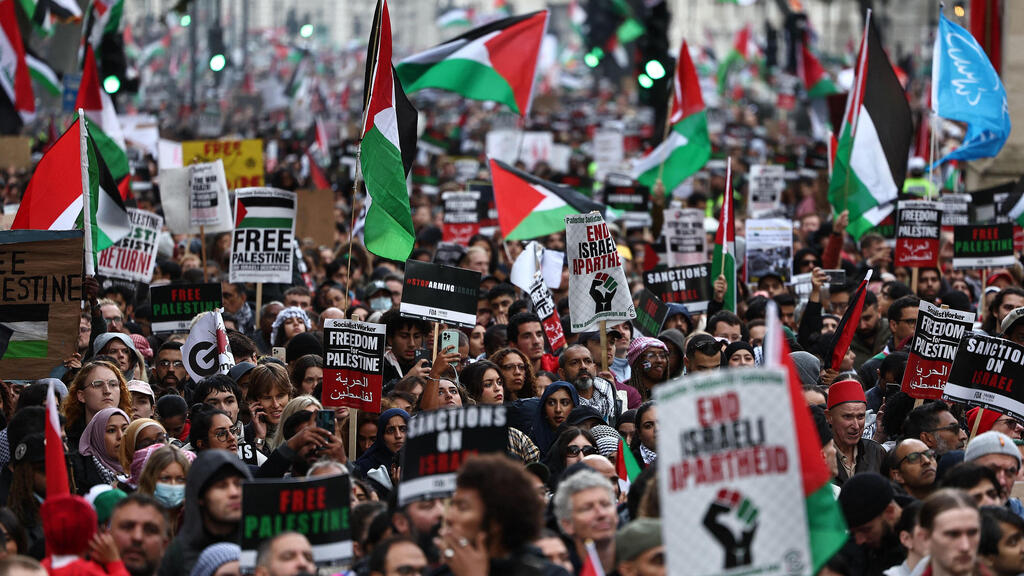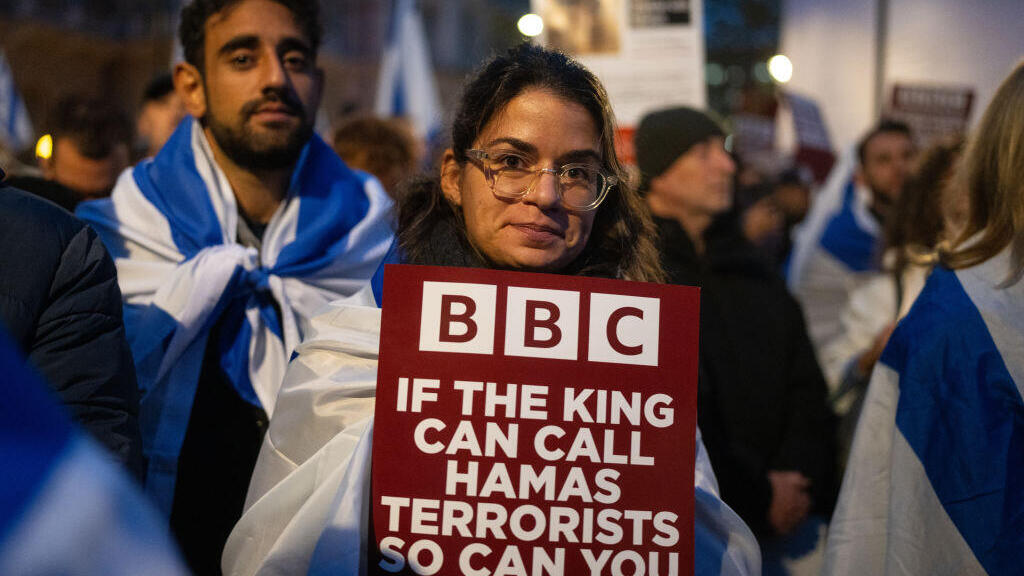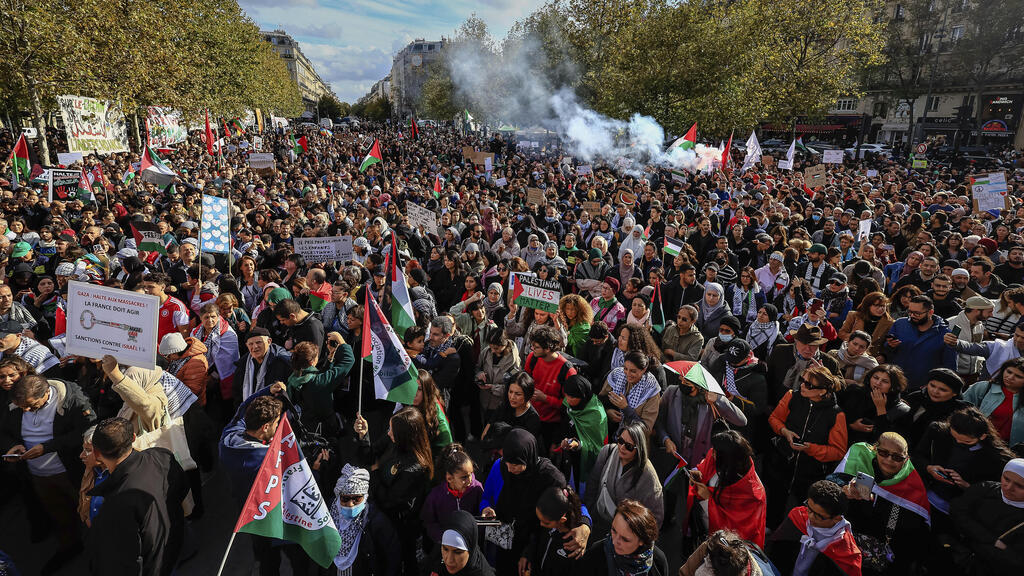Tens of thousands of protesters flooded London's streets, chanting 'Free Palestine' in a fervent demonstration that included anti-Israel and, on the outskirts, anti-Jewish slogans. This marks the most significant anti-Israel protest since the war began, reflecting a deep-rooted British street sentiment in support of the Palestinian cause.
How did we come to a situation where the Israeli public disapproves of the British media, perceiving it as biased and endorsing narratives akin to Hamas? This situation is puzzling, especially given Britain's strong alliance with the United States. Despite being a nation where many Israelis reside and visit, it has somehow become a symbol of anti-Israel sentiment in Europe, a stark contrast to the prompt visit by the U.S. President following the Hamas atrocities.
Read more:
Dr. Shmuel Lederman, a research fellow at the Forum for Regional Thinking, points out that "understanding the dynamics in the British Isles requires distinguishing between Ireland and England. In Ireland, the anti-Israel sentiment primarily stems from their historical identification as a conquered nation during the British occupation.
They perceive the Palestinian struggle as analogous to their own historical fight and naturally align themselves with this side of the conflict. Although not every Irish individual necessarily opposes Israel, this viewpoint is prevalent and is also reflected in the positions taken by local politicians. Their perception is influenced by the memory of British colonialism that once governed them, leading them to see Israel as an authoritative entity over the Palestinians, akin to a colony. This robust anti-colonial consciousness forms the basis of their pro-Palestinian stance".
In the post-war period in England: There has been a 1,353% surge in the number of anti-Semitic incidents. The country has witnessed 533 anti-Semitic events. There have been 150 incidents targeting Jews on campuses, according to Ministry of Diaspora Affairs
What is unfolding in England?
"In England, the situation is intricate. On one hand, there are Muslim communities that naturally sympathize with the Palestinians, constituting the majority of those seen protesting on the streets. The Palestinian cause and the holy sites hold significant importance in international Islamic consciousness, and it is consistently addressed in one way or another. Generally, it can be observed that if you are a Muslim in Britain, you are likely to support the Palestinians. However, it's important to note that this doesn't mean automatic endorsement of Hamas' actions, but rather a tendency to view Palestinians as victims in the conflict".
The perspective of Muslims can be grasped, but why do many non-Muslim Englishmen also harbor anti-Israel sentiments?
"Complex dynamics are at play here, and it's essential to understand the processes that have unfolded in the global left over the last three decades. Virtually every aspect of the global left's agenda is intertwined with support for the Palestinians. Take, for instance, the issue of the Iraq war, which Britain was involved in as well. According to the left's analysis, it was primarily linked to oil rather than the fight against terrorism, viewed as a perpetuation of American imperialism. They perceive a parallel in our conflict: Israeli military power, backed by the United States and Britain, is seen as part of Western imperialism. For some, Israel serves as a testing ground for weapons later sold to various questionable regimes. Additionally, criticism arises from anti-corporate and anti-militarist movements, with Israel often at the center of these discussions".
Another aspect to consider is the history of England itself. According to Lederman, one of the focal points of the Western left in recent decades has been addressing the legacy of European colonialism. He notes, "there is a sense of guilt and a desire for historical rectification regarding the crimes of colonialism—such as the killing of indigenous people, territorial occupation, exploitation of natural resources, and even slavery, for which the British were no less culpable than the Americans.
"And how do they perceive our conflict today? Exactly in those terms. They see it as 'superior whites' governing another nation. Israelis are viewed as colonizers settling on lands belonging to others. For some, all Israelis are considered settlers, whether they are an innocent family in a kibbutz or young people enjoying a nature party".
So must Israelis say: "you've committed past crimes, and now you're trying to cleanse your conscience at our expense?"
"It's obvious that finding peace of mind at the expense of others is a straightforward reality, and this perspective is entirely valid, as acknowledged by Israelis. However, these perspectives shouldn't be dismissed. Their intentions are essentially noble; this perspective aligns with their worldview, and it's natural for them to analyze the situation and back the Palestinians. The issue arises when some become so steadfast in their agenda that they cannot even perform the fundamental human act of condemning terrorism and civilian casualties. These well-meaning intentions often lead to a sort of moral dilemma".
One could counter their arguments by pointing out that discussing human rights, equality, and freedom is commendable. However, where is the support when the citizens of Gaza live under the rule of a terrorist organization, devoid of the very rights being advocated for?
"That's a valid point, but some individuals fail to delve into the complexities and perceive Hamas as a resistance organization—a national movement reminiscent of anti-colonial struggles from the past. They acknowledge that past resistance movements have engaged in violence, viewing Hamas through this historical lens while overlooking its actions in Gaza. This perspective oversimplifies the situation. In my view, many are unaware of the realities inside Gaza and focus solely on the conflict with Israel. Some attempt to resolve it by stating, 'we stand with the people of Gaza, not Hamas'".
The British Media
In the context of the British media, Naftali Bennett's frequent clashes with the BBC, the network's inaccurate coverage of the Gaza hospital bombing, and the headlines in the "Guardian" newspaper over the past years have raised concerns among the Israeli public. They tend to view most of the British media as biased in favor of the Palestinians. Lederman's surprising observation reveals that Palestinians also have their grievances, perceiving the prominent media outlets as pro-Israeli.
"It's purely a matter of perspective. Israelis firmly see all of Hamas as terrorists, while from the BBC's standpoint, aiming to maintain neutrality and credibility among as many viewers as possible, their longstanding policy refrains from labeling anyone as a terrorist. This doesn't imply anti-Israel sentiment but rather an effort to remain impartial. I understand the Israeli perspective, but this is the BBC's policy. In interviews with Palestinians, most questions from the interviewers revolve around the events of October 7th. Palestinians argue that this approach is flawed and consider any interview not beginning with the occupation or even the Nakba as anti-Palestinian".
"There's unquestionably a substantial presence of the global left in Britain, evident by figures like Jeremy Corbyn, a prominent advocate of this ideology, who came very close to assuming power. British history, coupled with these ideological perspectives and a substantial Muslim community, shapes the scenes witnessed on the streets of London".
Lederman suggests that the trend within the global left is not unique to Britain, yet it appears more prominent there than in other European nations. This observation might clarify the significant presence of demonstrators in London protesting against Israel.
Let's imagine a scenario where all the aspirations of the global left come to fruition: Israel ceases to exist, and there is a unified Palestine stretching from the river (Jordan) to the sea. What do they envision happening in this situation? Will it usher in a celebration of democracy and human rights?
"Their ultimate goal is the establishment of a single state from the river (Jordan) to the sea. However, this vision is largely rooted in idealistic assumptions, believing that under the right conditions, people would choose to lead peaceful lives without imposing their ideologies on others. This perspective significantly underestimates the influence of radical ideologies and their consequences. They assume that in the absence of oppression and occupation in their concept, people will naturally seek a peaceful existence, and extremist movements like Hamas will lose their influence".
That's more of a fantasy.
"Indeed, this perspective is entirely divorced from the realities on the ground. It fails to acknowledge the presence of a Jewish state here, which is deeply committed to preserving its identity. Moreover, it disregards the aspirations of many Palestinians for their own independent state, rather than some hypothetical collaboration with another entity. There's unquestionably a substantial presence of the global left in Britain, evident by figures like Jeremy Corbyn, a prominent advocate of this ideology, who came very close to assuming power. British history, coupled with these ideological perspectives and a substantial Muslim community, shapes the scenes witnessed on the streets of London".
The support for Palestinians has led to the demonization of Israel
Dr. Natan Aridan, a specialist on Britain from the Ben-Gurion Institute for the Study of Israel and Zionism at Ben-Gurion University, clarifies, "these demonstrations are a result of the perception of Israel as Goliath against the Palestinian David, a view that has persisted since 1967. This sentiment is intricately linked with the internal politics in Britain. In England, students and workers are highly organized in their protests, channeling their sympathy for Palestinians into a demonization of Israel".
According to Dr. Aridan, "In France, a certain percentage of immigrants have roots in the Maghreb (northwest Africa, including Morocco, Algeria, and Tunisia). However, in England, most Muslims come from Bangladesh, Pakistan, or parts of India. They are highly organized and have taken control of pro-Palestinian demonstrations in the country. Despite not having visited Israel or the Palestinian territories, mosques are rife with incitement against Jews and Israel. Despite their denials, they insist that their criticism of Israel is purely political and not anti-Semitic. However, this argument doesn't withstand scrutiny, as their language often includes terms like genocide and apartheid, suggesting incitement and demonization rather than legitimate political critique. Moreover, this entire operation is funded by significant resources".
Where does this funding originate?
"They collect funds under the pretext of assisting Palestinians, often channeled towards charities for hospitals and the impoverished. However, some of these funds end up in the hands of terrorist organizations or are manipulated by them. Crafting a narrative of the powerful versus the vulnerable makes fundraising quite straightforward. It's crucial not to stigmatize all Muslims, but certain protesters justify their actions based on the terror attacks of October 7th. They accuse Israel of committing crimes against humanity without acknowledging Hamas' actions. Their ultimate goal is for us to vanish from the map and for Israel to cease to exist".
Where does the typical English individual, neither Muslim nor Jewish, stand on this issue?
"The average English person, who isn't politically active, is largely indifferent to the conflict; it doesn't pique their interest. Their concerns revolve around practical matters like escalating fuel costs or the economic repercussions of the war; not much more than that. Generally, when people on the streets witness airstrikes and the tragic aftermath for Palestinians, they tend to sympathize with them automatically. However, how many English people were deeply concerned when Allied forces bombed Germany and caused civilian casualties? Many are fortunate to have never experienced the horrors of war, and I'm grateful for that. Yet, this lack of firsthand understanding leads to a limited grasp of the situation's complexity. They tend to evaluate us differently than they do the Palestinians, employing unique moral criteria and legal principles. Some aim to reconcile their own history through the lens of this conflict".
"Many Britons still recall our resistance against the mandate, including the loss of British soldiers' lives. This historical awareness persists. Some even blame Britain, asserting that the Balfour Declaration itself sparked Zionist consciousness and the fight for the future of the Land of Israel. This, in turn, led to numerous challenges in the Arab world, a fact embedded in British collective memory".





